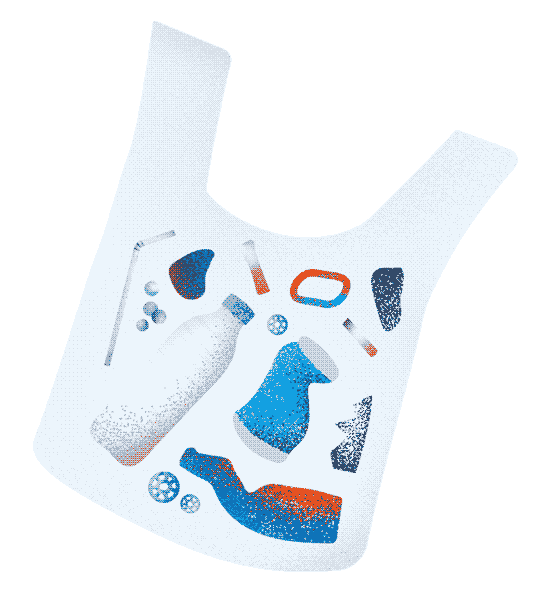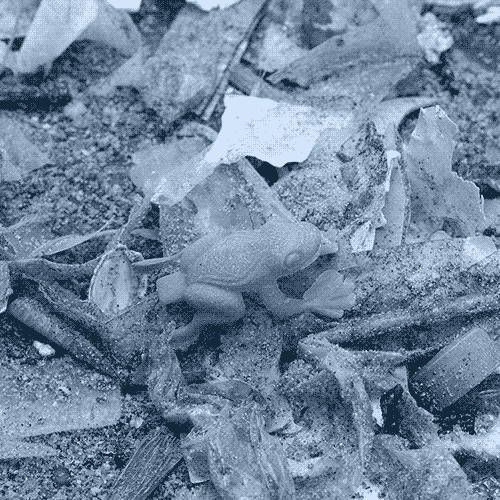MACROPLASTICS, SINGLE-USE PLASTICS AND PACKAGING WASTE
A colossal challenge

Single-use plastics are designed to be thrown away after a few seconds or minutes of a single use.
Bottles, plastic bags, cigarette butts, cotton buds and food packaging are all examples of macroplastics which, according to Surfrider’s annual environmental reports, continue to invade our beaches on a massive scale and are evidence of persistent water pollution.
The challenge is enormous: plastic production continues to grow!
Global plastic production has increased from 1.5 million tonnes in 1950 to 450 million tonnes in 2020(1). According to projections, it could reach nearly 740 million tonnes by 2040(2).
Industrial failures and poor waste management mean that a significant proportion of these macroplastics escape from treatment systems and are dispersed into the environment, with dramatic consequences for biodiversity.
Once released into the environment, they gradually break down into micro-particles, causing long-term contamination of the oceans.
As they degrade, these plastics release toxic chemicals, polluting ecosystems and threatening human health. This environmental crisis requires an urgent transformation of our consumption patterns in order to preserve the ocean and biodiversity.
(1) Organisation for Economic Co-operation and Development (OECD). Global Plastics Outlook: Plastics Use by Polymer Projections to 2060. 2022.
(2) OECD. Policy Scenarios for Eliminating Plastic Pollution by 2040. 2022.
Our approach and requirements

1.
Ending pollution from single-use plastics and packaging waste
Surfrider Foundation Europe actively participated in the adoption of the Single-Use Plastic (SUP) Directive, notably through significant advocacy work based on scientific data collected during participatory science operations.
This field data provided a robust scientific basis for our advocacy arguments to European institutions, demonstrating in concrete terms the extent of single-use plastic pollution on our coastlines.
Six years after the start of the implementation of the Single-Use Plastics Directive in the Member States of the European Union, Surfrider, in collaboration with other organisations (within the coalitions to which it belongs), is rigorously monitoring its implementation in the Member States and publishing annual evaluation reports.
These analyses identify gaps in the application of the regulations and maintain pressure on national governments for ambitious transposition.
Packaging regulations: targeting the hospitality industry
On the Packaging and Packaging Waste Regulation (PPWR), published in the Official Journal of the European Union on 22 January 2025, Surfrider Foundation Europe focused its advocacy work on reducing packaging and packaging waste in the HORECA sector (hotels, restaurants and cafés). Faced with the alarming increase in packaging waste, the NGO has mainly advocated for the implementation of reuse, in line with the French position.
Although our teams did not achieve a complete ban on single-use paper packaging, they did succeed in having the ban on single-use plastics included in the final regulation.
2.
Put an end to false solutions and greenwashing
Surfrider Foundation Europe works to achieve a real reduction in plastic pollution, which means fighting resolutely against false solutions that divert attention from the real issue: reduction at source.
In the face of the major plastic pollution crisis, solutions are often presented as ideal responses: recycling, bioplastics, cleaning up the oceans.
However, none of them address the root of the problem.
Some key figures on
single-use plastic pollution
65%
as part of our collection and monitoring programmes are single-use plastic waste products.
740m
should be produced by 2040
Going further
